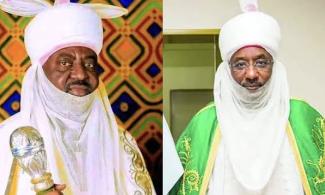
The law was used to reinstall Muhammadu Sanusi II, who had been dethroned by Ganduje in 2020, as the 16th Emir of Kano.
A Federal High Court sitting in Kano State on Thursday invalidated all actions taken by the Kano State government to repeal the Kano Emirates Council Law 2024.
Recall that the Kano House of Assembly had originally repealed the law, leading Governor Abba Kabir Yusuf to implement it by removing Alhaji Aminu Ado Bayero as the Emir of Kano.
Also, the governor reversed the establishment of four emirates—Bichi, Rano, Karaye, and Gaya—that were created by his predecessor, Dr. Abdullahi Umar Ganduje.
The law was used to reinstall Muhammadu Sanusi II, who had been dethroned by Ganduje in 2020, as the 16th Emir of Kano.
However, Aminu Babba Danagundi, a kingmaker in the former Kano emirate known as Sarkin Dawaki Babba, challenged the legality of the law.
Represented by his counsel, Chikaosolu Ojukwu (SAN), he petitioned the court to declare the law null and void.
In a ruling delivered on Thursday, Justice Abdullahi Muhammad Liman, overturned the actions of the Kano government and directed all parties to maintain the status quo ante.
SaharaReporters had on Wednesday reported that human rights lawyer, Femi Falana, SAN, faulted the decisions of the Federal High Court and National Industrial Court on the emirship tussle in Kano State, describing both decisions as "highly erroneous."
Falana had insisted that the decisions could not be justified under Sections 251 and 254 (C) of the constitution.
The fiery human rights lawyer, who made his position known in a statement titled, "Federal High Court and National Industrial Court lack Jurisdiction To Determine Chieftaincy Matters," had advised that judges and lawyers should realise that disputes arising from chieftaincy and other local matters are within the exclusive jurisdiction of the High Court of each state of the Federation.
This he postulated notwithstanding that the country is operating a distorted federal arrangement.
The legal luminary had said that hiding under fundamental human right enforcement to dabble into the Chieftaincy Matters was wrong, maintaining that chieftaincy is not a matter of fundamental Rights and cannot be enforced under the provisions of section 31 of the Constitution.